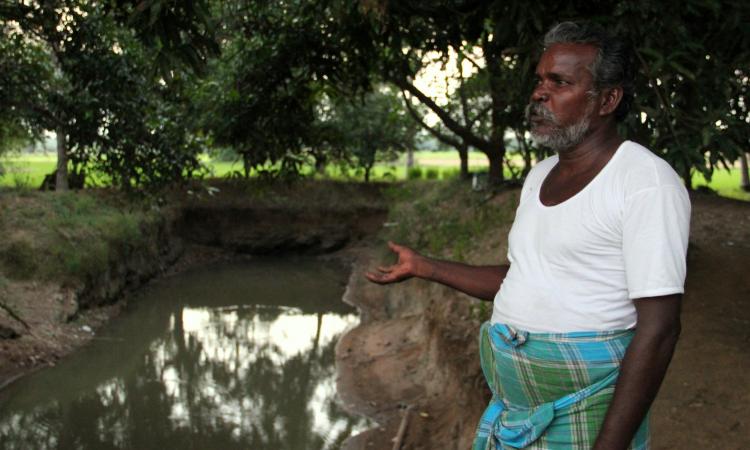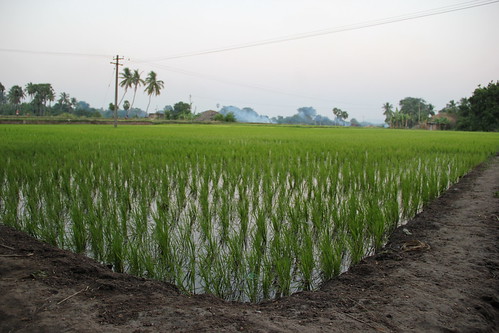
Elumalai holds 8 acres of farmland in the village of Keelathivakkam near Orathi, which is in Kanchipuram, Tamil Nadu. Paddy is his main crop, currently occupying more than 6 acres of the property. A small mango grove and some jackfruit trees complete his inheritance. In addition to crop production, he has managed to effectively integrate poultry, goat and fish rearing along with bee-keeping. He is one of the first and most successful farm pond fish farmers in his area.
Keelathivakkam is one of the identified ‘Micro-Watersheds’ in the district. A Watershed is any area with a gradual slope, as a result of which run-off water from the slopes tends to collect in a common location. The simpler explanation is that water moves from higher to lower slopes and collects in a natural depression. When this identified geohydrological (geography+ waterflow) unit is between 100 and 1000 acres, it is known as a micro-watershed.
The Tamil Nadu Government decided to adopt Keelathivakkam under the National Watershed Development Project for Rainfed Areas (NWDPRA). This project established institutions and structures to manage the area’s water resources effectively. Measures to hold the water where it fell, reduce run-off to check soil erosion and increase rainwater infiltration are all combined to conserve, protect and improve the area’s land and water. A Water User Association was established in the village to oversee all activities relating to the construction and maintenance of tanks.
After attending a meeting in the district’s Krishi Vignyan Kendra, Elumalai thought it would be a good idea to dig a pond in his farm to impound water and thereby increase the moisture content in the land around it. He made use of the NWDPRA subsidy to dig the pond and had to pay only 50% of the total cost of Rs.25,000. The pond's dimensions were 28 metres x 8 metres x 10 feet. That's as long as a basketball court but half as wide and it was dug in just two days. Silt from the tanks and lakes are usually applied on farm fields are they are rich in nutrients. Elumalai managed to to line the bottom of his pond with some silt taken out from a nearby lake to enrich the water used to irrigate his field.
The pond fills up with rainwater during the monsoons and during the remaining months, Elumalai fills it up with water from the dug well close by. It is not allowed to empty for two reasons: One, he farms fish in his pond and two, he uses the nutrient-rich water (enriched with fish and poultry droppings) to irrigate his field. The poultry pen is located close by and he dumps the droppings into the pond every two days. The pond is emptied and refilled once every month to make sure the water has enough oxygen for the fish. Elumalai claims that the need for fertilizers has come down considerably ever since he started using the pond water for irrigation.
Local favourites Catla and Rohu (Kendai in Tamil) are housed in the pond for close to ten months. Elumalai usually harvests the fish in January or February. No marketplace and no middlemen. The catch is usually completely sold out as locals purchase it directly from his farm. It has been 5 years since he introduced fish seed into his farm pond. Come next month, he will reap his fourth harvest. Every year he invests close to Rs. 6,000 for the fish seed and feed and claims that he is doubly compensated.

As his paddy crops droop heavily in his fields promising a rich harvest, a bonus lottery awaits in the pond closeby.